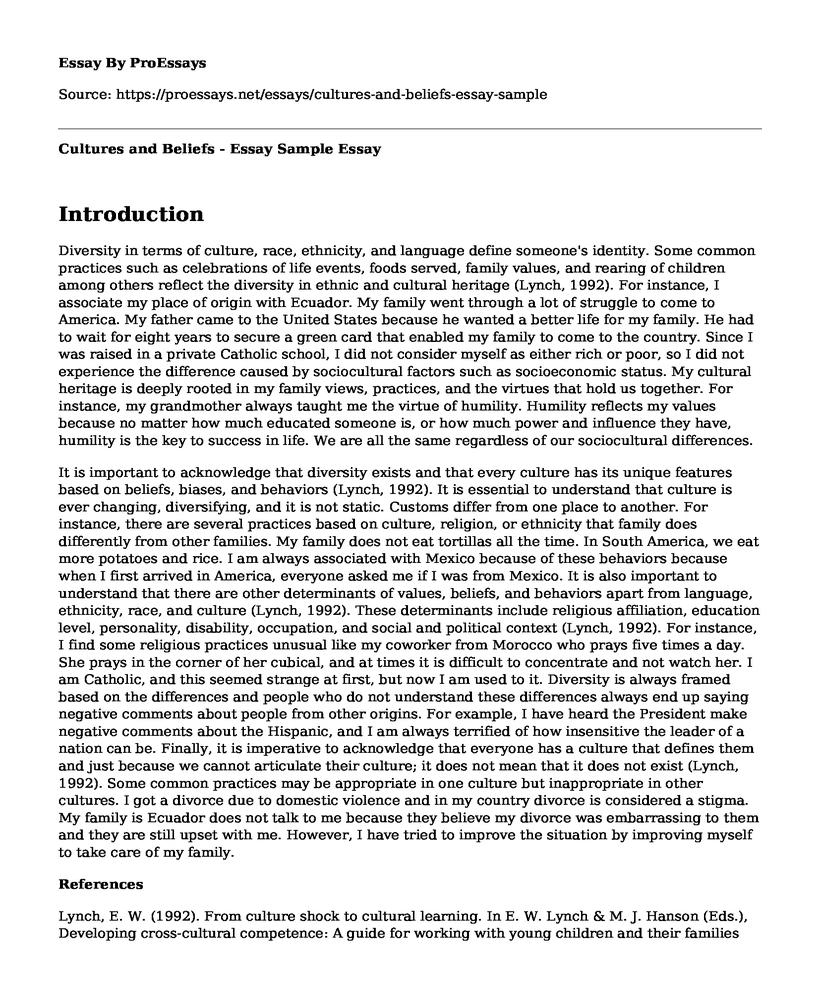Introduction
Diversity in terms of culture, race, ethnicity, and language define someone's identity. Some common practices such as celebrations of life events, foods served, family values, and rearing of children among others reflect the diversity in ethnic and cultural heritage (Lynch, 1992). For instance, I associate my place of origin with Ecuador. My family went through a lot of struggle to come to America. My father came to the United States because he wanted a better life for my family. He had to wait for eight years to secure a green card that enabled my family to come to the country. Since I was raised in a private Catholic school, I did not consider myself as either rich or poor, so I did not experience the difference caused by sociocultural factors such as socioeconomic status. My cultural heritage is deeply rooted in my family views, practices, and the virtues that hold us together. For instance, my grandmother always taught me the virtue of humility. Humility reflects my values because no matter how much educated someone is, or how much power and influence they have, humility is the key to success in life. We are all the same regardless of our sociocultural differences.
It is important to acknowledge that diversity exists and that every culture has its unique features based on beliefs, biases, and behaviors (Lynch, 1992). It is essential to understand that culture is ever changing, diversifying, and it is not static. Customs differ from one place to another. For instance, there are several practices based on culture, religion, or ethnicity that family does differently from other families. My family does not eat tortillas all the time. In South America, we eat more potatoes and rice. I am always associated with Mexico because of these behaviors because when I first arrived in America, everyone asked me if I was from Mexico. It is also important to understand that there are other determinants of values, beliefs, and behaviors apart from language, ethnicity, race, and culture (Lynch, 1992). These determinants include religious affiliation, education level, personality, disability, occupation, and social and political context (Lynch, 1992). For instance, I find some religious practices unusual like my coworker from Morocco who prays five times a day. She prays in the corner of her cubical, and at times it is difficult to concentrate and not watch her. I am Catholic, and this seemed strange at first, but now I am used to it. Diversity is always framed based on the differences and people who do not understand these differences always end up saying negative comments about people from other origins. For example, I have heard the President make negative comments about the Hispanic, and I am always terrified of how insensitive the leader of a nation can be. Finally, it is imperative to acknowledge that everyone has a culture that defines them and just because we cannot articulate their culture; it does not mean that it does not exist (Lynch, 1992). Some common practices may be appropriate in one culture but inappropriate in other cultures. I got a divorce due to domestic violence and in my country divorce is considered a stigma. My family is Ecuador does not talk to me because they believe my divorce was embarrassing to them and they are still upset with me. However, I have tried to improve the situation by improving myself to take care of my family.
References
Lynch, E. W. (1992). From culture shock to cultural learning. In E. W. Lynch & M. J. Hanson (Eds.), Developing cross-cultural competence: A guide for working with young children and their families (pp. 19-34). Baltimore, MD, England: Paul H. Brookes Publishing.
Cite this page
Cultures and Beliefs - Essay Sample. (2022, Dec 20). Retrieved from https://proessays.net/essays/cultures-and-beliefs-essay-sample
If you are the original author of this essay and no longer wish to have it published on the ProEssays website, please click below to request its removal:
- The Examined Life According to Socrates Essay
- Friedrich Nietzsche Biography
- Moral Responsiveness Despite Technological Advancement Essay
- Ethics in Political Science Essay Example
- Morality of Abortion: Thomson vs Marquis - Essay Sample
- Essay Sample on Evil in World Religions: Defining Good and Bad
- Paper Example on Domestic Violence: Injuries, Control, and Children Affected







